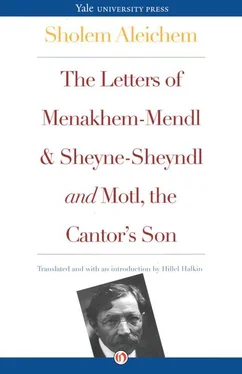Your truly faithful wife,
Sheyne-Sheyndl
Do me a favor, Mendl. Write me no more about your Yehupetz charlatans and their Kepsweiber —I don’t want to hear the filthy word. They should all roast! Listen to this instead. The son of Levi Moyshe-Mendes, Berish is his name (that’s after his grandfather Reb Berishl, may the old scoundrel rest in pieces), turned up this week with two accomplices at Libe Moyshe-Mordekhai’s store and said to Libe’s daughter Feygl (Fanitshke she calls herself — what a name!), “Fanitshke, my love,” he says, “come let me look at your finger.” So Fanitshke shows him her finger and he slips a ring on it and tells his friends, “You’re my witnesses that I’ve taken Fanitshke as my wife according to Jewish law.” You should have seen the commotion! Libe fainted dead away. The whole town came running with its mouth open. Everyone put in his two cents. In the end they went to the rabbi, who told Berish to give Fanitshke a divorce. But Fanitshke said she didn’t want one. She was, she said, in love with him. The poor girl is hopelessly in- fat -you-ated, the two of them planned it together. Just put yourself in place of the father! And I thought I had problems …
FROM MENAKHEM-MENDL IN YEHUPETZ TO HIS WIFE SHEYNE-SHEYNDL IN KASRILEVKE
To my wise, esteemed, & virtuous wife Sheyne-Sheyndl, may you have a long life!
Firstly, rest assured that I am, praise God, in the best of health. God grant that we hear from each other only good and pleasing news, amen.
Secondly, finance is strictly for beggars. Lending money is not a bad occupation provided the money is your own. When it’s someone else’s, all you get is the runaround. And God preserve you from falling into the clutches of a loan shark, one of your garden-variety Berdichev, Vinnitse, or Shpole twenty-percenters, let alone the big bankers, who give you such a hard time that you’re better off clipping lottery coupons…. In short, I’ve sent finance to the devil and now am in real estate. Why real estate? Because it’s all the rage. If you think buying a house in Yehupetz is like buying a house in Kasrilevke, you’re mistaken. The first thing you do here is take a mortgage from the bank; next you take a second mortgage; then you rent out the rooms and have an income. In a word, the house costs nothing and you’re its lucky owner! Why, then, you ask, doesn’t everyone buy one? Because not everyone can afford the down payment. If, with God’s help, the deal I’m working on pans out (I have several in the fire), I’ll buy a place for 20,000, not a red cent of which will be mine, and register it in your name. The arithmetic is simple: 15,000 comes from the first bank, 6,000 from the second, and a thousand stays with me. That’s enough to live off for a while, even minus the rent and other goodies. Where do you think all the fortunes in Yehupetz come from? But since I’m busy and in a hurry, I’ll be brief. God willing, I’ll write more in my next letter. Meanwhile, may He grant you health and success. Give my fondest greetings to the children, each and every one.
Your husband,
Menakhem-Mendl
P.S. What you write about Levi Moyshe-Mendes’ son and Libe’s daughter would be back-page news in Yehupetz. Here falling in love is a must; without it there’s simply no match. It’s not unusual for a man to throw over his wife for another woman he’s fallen in love with, or for a woman to throw over her husband. Sometimes the woman who was thrown over falls in love with the husband of the wife who was thrown over — I mean, with the husband of the wife who threw over her husband. How did the rabbis put it? “What’s mine is yours and what’s yours is mine.” That’s Yehupetz!
Yours, etc.
FROM SHEYNE-SHEYNDL IN KASRILEVKE TO HER HUSBAND MENAKHEM-MENDL IN YEHUPETZ
To my dear, learned, & illustrious husband Menakhem-Mendl, may your light shine!
First, we’re all well, thank God. I hope to hear no worse from you.
Second, who ever heard of a man walking out on his wife, children, and in-laws, moving to a strange town, and changing his line of work twice a day? First he pushes sugar, then he lends money, and before you know it he’s buying houses on the house! I daresay it would be a fine business if only owning a house that you owe more for it than it’s worth weren’t worse than being trapped in a fire. (Speaking of which, why doesn’t one burn down Yehupetz?) Lucky me! As soon as his lordship’s chickens hatch, he’ll buy me a house in my name. What do I need another house for? Send money and I’d know what to do with it. As my mother, God bless her, would say, “Bring the bread and I’ll find the cutting knife …”
I suppose I should make my peace with the fact that life has it in for me. Still, I can’t help thinking: here I am a Jewish wife like Blume-Zlate, she’s no prettier than I am, she’s certainly no smarter or cleverer — why do I end up in the doghouse while she gets more full of juices by the day? Dear God, I’d like to see her dry up like an old hag! And yet to be honest, what do I have against Blume-Zlate? What harm has she done me? I wouldn’t mind her reaching a ripe old age with her Nekhemye if only God were nicer to me. “Better to wish yourself well than another ill,” as my mother says.
It makes my heart ache to see people living such fine lives when I have to sit here like a widow in black, waiting to hear from my fine breadwinner! Each day I think: this could be our lucky one. Perhaps a buried treasure will come your way and you’ll build me a palace in Yehupetz! But your fine Yehupetz wife-swappers can break all their bones before I throw away my wig and give up everything to become your Kepsweib there. I wish you well from the bottom of my heart,
Your truly faithful wife,
Sheyne-Sheyndl
My mother says, “It’s not brains or good looks that a person needs, it’s luck.” Take Nekhameh-Breindl and my Aunt Dvoyreh’s daughter Rokhl. Nekhameh-Breindl glows like the summer sun and Rokhl is sour as vinegar. So what happens? Poor Nekhameh-Breindl is a wallflower and Rokhl finds a husband — a fine, honest fellow, an idiot from Yampele. That is, he has his brains in his behind, but he comes from a good family. The only thing wrong with it, they say, is that a sister of his has been baptized. And his health is poor, too, which means he needn’t fear the draft. They’re a lovely couple — she doesn’t mind his not being too bright and he doesn’t mind her not looking so good. But beauty makes nothing good, my mother says. It’s goodness that makes everything beautiful.
FROM MENAKHEM-MENDL IN YEHUPETZ TO HIS WIFE SHEYNE-SHEYNDL IN KASRILEVKE
To my wise, esteemed, & virtuous wife Sheyne-Sheyndl, may you have a long life!
Firstly, rest assured that I am, praise God, in the best of health. God grant that we hear from each other only good and pleasing news, amen.
Secondly, Yehupetz real estate is for the birds. I’m now in country property. Country property is a different kettle of fish. In the first place, you needn’t wear out your shoes. You mail a letter, get back an itemized praysee, send your customer for a look — and with God’s help, you’ve rung up a sale. And in the second place, you’re not dealing with a lot of poor devils. You’re talking landed gentry — princes, counts, grafs. How do I get to rub elbows with grafs? That’s a story in itself.
You know I’m not supposed to be in Yehupetz. Well, now and then the police show up at our boarding house to search for bad apples. We’re always tipped off in advance by our landlady and away we melt like salt in water — some of us to Boiberik, some to Demyevka, and some to Slobodka. This time, though, the landlady wasn’t warned herself. A bad business! There we were, sound asleep in the middle of the night, when there’s a knock. The landlady jumps out of bed. The cat’s at the door, all mice in the straw! Naturally, there’s a rush for the exits. Half of us head for the cellar and the other half for the attic, including me. Next to me is a Jew from Kamenetz, and as we’re lying on the floor with aching ribs he lets out a groan. “What’s the matter?” I whisper. “I just remembered something,” he says. “I left my papers under my pillow. I’m worried sick about my papers!” “What papers are those?” I ask. “Oy,” he says, “very important ones. We’re talking half-a-million at the least.” Well, as soon as I hear half-a-million, I turn on my back and whisper, “What papers can be worth all that money?” “It’s country property,” he says. “I have property in Volhynia, a big estate with the latest equipment, and horses, and oxen, and more sheep than you can count, and water mills, and breweries, and farmyards, and top-notch gardeners, all in perfect condition!”
Читать дальше












